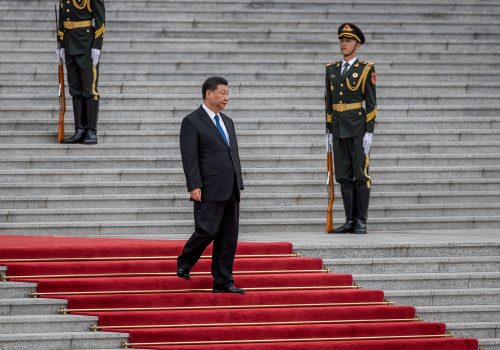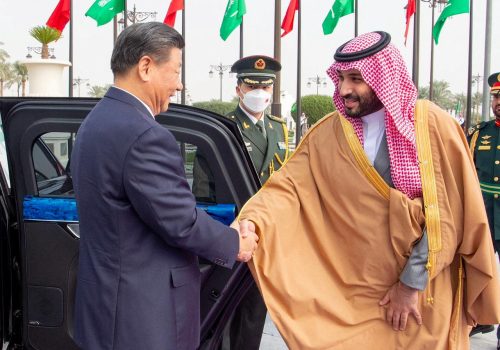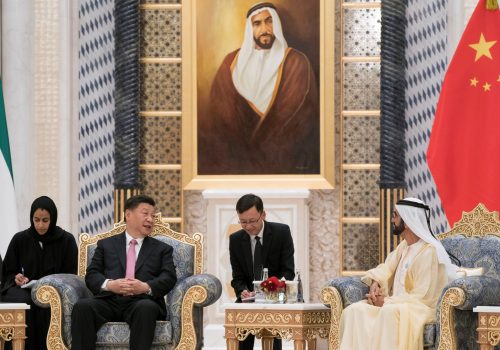China’s de-dollarization message finds a receptive audience in North Africa
Earlier this year, three of five countries in North Africa—Tunisia, Algeria, and Egypt—applied to join BRICS, the loose affiliation of Brazil, Russia, India, China, and South Africa, which exists to challenge US influence in the global economy. Ultimately, BRICS decided not to admit Algeria and Tunisia as new members. However, the inclusion of Egypt and enthusiasm for the BRICS project in Algiers and Tunis foreshadow that North African states may become some of the most aggressive advocates for one of BRICS’s top priorities: de-dollarization.
A coordinated and concerted de-dollarization effort in North Africa poses a significant threat to US interests in the region and the African continent at large by existing regional trade groupings and agreements. US policymakers must recognize the gathering financial storm in North Africa and respond accordingly.
The expansion of BRICS should concern US policymakers for several reasons, including the group’s commitment to global de-dollarization, which has, thus far, shown limited progress but does pose a long-term threat to the dollar’s hegemony. De-dollarization attempts to replace the dollar as the world’s preferred reserve currency, thereby significantly reducing US influence over the global financial system. Any coordinated de-dollarization effort, especially toward China’s renminbi, would diminish the ability of the United States to run large federal deficits and keep interest rates on accumulated debt relatively low.
Typically, de-dollarization means the movement away from US dollars in favor of the local currency. Countries wanting to regain control over monetary and exchange rate policy, recoup seigniorage, and reduce foreign exchange risk in the financial system and other sectors have initiated de-dollarization policies to varying degrees of success in the past.
However, the goal of the BRICS effort is not to increase the use of local currencies—although “alternative financial plumbing” is an interim step of the de-dollarization process—but rather to replace the US dollar with the “R5,” a reference to the five currencies used by the founding BRICS members: the renminbi, ruble, rupee, real, and rand, or with other multilateral central bank digital currency (CBDC) as the new global currency that undergirds international finance. In practice, China and its BRICS partners are pushing de-dollarization as an economic weapon to reduce US influence in the global financial system.
In addition, de-dollarization would undermine the effectiveness of US sanctions regimes, a critical foreign policy tool in the fight against terrorist networks, rogue regimes, and criminal networks. These sanctions rely on the SWIFT financial system, which is a network that banks use to communicate with each other securely. It currently powers most international money and security transfers. However, switching to a multilateral CBDC would make SWIFT obsolete.
BRICS capitalizes on members’ trade group affiliations
When BRICS expanded its membership in August, much of the attention was focused on the domestic economies of six new members: Argentina, Ethiopia, Egypt, Iran, Saudi Arabia, and the United Arab Emirates (UAE). However, the true value of BRICS expansion is not simply in the inclusion of petrol-producing states but also in the trade groups of which these countries are members.
The original five BRICS countries are all leading members in regional trade arrangements: China in the Regional Comprehensive Economic Partnership; India in the South Asian Association for Regional Cooperation; Russia in the Eurasian Economic Union and the Commonwealth of Independent States; Brazil in the Southern Common Market; and South Africa in the Southern African Customs Union. If BRICS successfully launches the R5, there is a legitimate threat that the trade groupings of these countries will also feel compelled to adopt the R5—at least alongside the US dollar, if not as a replacement.
It might appear counterintuitive for BRICS to reject Algeria’s and Tunisia’s membership applications. After all, BRICS expansion is intended to diminish US influence in the global financial system while increasing its own. However, upon closer examination, the rejection of the two North African countries makes sense.
Algeria has a long history of fiercely guarding its sovereignty and independence due, in part, to its experience under French rule. Tunisia’s economy is in free fall and careening toward collapse due to decades of unsustainable public sector spending, poor financial management, and global economic shocks, such as the COVID-19 pandemic and the war in Ukraine. It would be unlikely, if not unprecedented, for Algiers to agree to an economic arrangement that caused a monetary and exchange rate policy loss.
By including Egypt, BRICS can influence Algerian and Tunisian de-dollarization through Egyptian leadership inside existing trade regimes. Through Egypt, the UAE, and Saudi Arabia, BRICS will have expanded access to the Greater Arab Free Trade Area (GAFTA) and the Common Market for Eastern and Southern Africa. Collectively, the expanded BRICS network via these trade organization connections now eclipses ninety countries.
Moving these countries off the US dollar either entirely or partly via adopting an alternative digital currency, such as a CBDC, would allow more and more financial data and transactions to occur outside the SWIFT transactional system. In bypassing SWIFT, countries and other actors, such as terrorist networks or criminal enterprises, can circumnavigate financial and economic sanctions—an appealing option for heavily sanctioned US adversaries such as Russia, Iran, and North Korea.
China has already launched its own competitor to SWIFT, the Cross-Border Interbank Payment System (CIPS), which is a renminbi settlement mechanism that has grown rapidly to include 119 direct and 1,304 indirect participants globally, according to the Atlantic Council’s Dollar Dominance Monitor. For China, in particular, the expanded use of CBDCs is an interim step of the de-dollarization effort that would eventually lead to adopting a CBDC controlled or manipulated by Beijing.
China’s interests in North Africa
China has tried to make de-dollarization more attractive for several years by issuing a digital renminbi or “digital RMB.” However, adoption of the digital RMB outside of China has been slow, and countries such as Russia and India are also launching their own CBDCs. For BRICS member countries, a joint effort to establish a digital currency will have a greater influence on the global financial system—the original five BRICS countries account for 31.5 percent of global GDP based on purchasing power parity. That percentage will increase by including the six new BRICS countries, eventually totaling more than the G7 countries combined (30.7 percent).
The role of China in North Africa is often reduced to the region’s incorporation into the Belt and Road Initiative (BRI), which is largely an infrastructure investment project. To be sure, the Maghreb is an integral part of the BRI effort, and all regional governments have signed memorandums of understanding with Beijing to join the BRI. However, China’s interests in North Africa extend beyond infrastructure to include a much larger global effort to undermine US influence in the traditional financial system. The effects of that effort are already on display.
In October, Egypt issued Chinese yuan-denominated bonds for the first time. And, in April, it was reported that Cairo was considering importing wheat in rupees and renminbi. The Bank of Russia also lists the Egyptian pound in the list of currencies for setting the daily exchange rates against the ruble. Perhaps as a harbinger of what is to come concerning Algerian energy supplies to international markets, China and France’s TotalEnergies completed the first renminbi-settled liquefied natural gas trade through the Shanghai Petroleum and Natural Gas Exchange in March (Algeria has already settled many trade transactions with China in renminbi).
The BRICS-led de-dollarization effort should alarm US policymakers, especially in light of the recent BRICS membership expansion. It is clear that traditional US allies, such as Egypt, Saudi Arabia, and the UAE, are already exploring ways to de-dollarize, and that Beijing is helping that process move forward. A recent example of such collaboration is the so-called “mBridge” project, where the banks of China, Hong Kong, Thailand, and the UAE—together with the Bank for International Settlements—have developed a CBDC platform to facilitate interoperability and connectivity. The mBridge will “make the digital RMB—and the digital currencies of the other member states—usable for cross-border payments in a multilateral setting.” If mBridge can deliver successfully, it will provide a proof-of-concept for the multilateral CBDC that BRICS hopes to launch to counter US influence in the global financial system.
For US policymakers, the BRICS de-dollarization effort should cause concern. A coordinated movement by several trade blocs off of the SWIFT financial system would be a significant blow to the existing US sanctions regime, effectively eliminating a critical foreign policy tool. Unfortunately, the US does not have a whole-of-government effort to counter the Chinese and Russian de-dollarization schemes. The Treasury Department has, at times, taken the lead, but efforts to prevent de-dollarization are scattered across State, Commerce, US Trade Representative, and other agencies. Thus far, Congress has not passed legislation that addresses this problem directly and the White House has not coordinated a response. At this point, what is needed is an interagency process that is buttressed by related legislative authorities to highlight the threat of de-dollarization.
Thomas Hill is the director for the North Africa Program at the US Institute of Peace. Previously, he served as a senior professional staff member for the House Committee on Foreign Affairs and as a foreign affairs officer at the US Department of State. Follow him on X: @seatodca.
Further reading
Wed, Feb 23, 2022
China and Russia are proposing a new authoritarian playbook. MENA leaders are watching closely.
MENASource By Ahmed Aboudouh
It’s on major Western democracies to make democracy appealing again by aggressively filling the gaps China and Russia exploit to make the world more accommodating to their political models and the new trend of rising authoritarianism.
Wed, Apr 5, 2023
China is getting comfortable with the Gulf Cooperation Council. The West must pragmatically adapt to its growing regional influence.
MENASource By Joseph Webster, Joze Pelayo
The US and its allies and partners must pragmatically adapt to China’s growing regional influence by providing credible alternatives to Beijing.
Thu, Jul 14, 2022
Biden’s Middle East trip focuses on the region. But China is the elephant in the room.
MENASource By Ahmed Aboudouh
US President Joe Biden’s visit to the Middle East on 13-16 July won’t directly focus on China. However, the rising power will be the elephant in the room at the Saudi summit in Jeddah.
Image: An employee counts U.S. dollar banknotes at a branch of Huaxia Bank in Shenyang, Liaoning province March 18, 2010. A rise in the yuan would be a disaster for labour-intensive Chinese exporters, a semi-official trade group said on Thursday, as frictions grow with the U.S. and other Western powers over Beijing's stable currency policy. The China Council for the Promotion of International Trade was checking with more than 1,000 exporters in 12 industries on whether they could cope with a stronger exchange rate, Zhang Wei, vice-chairman of the association, said. REUTERS/Sheng Li


